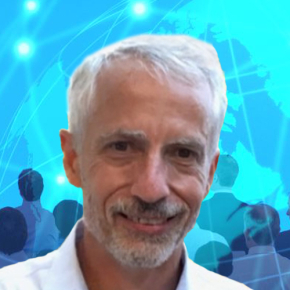The CNRS Institute of Chemistry welcomes Eric N. Jacobsen as the Ambassador in Chemical Sciences
On february 21st 2023*, Eric N. Jacobsen will start a series of lectures in several French CNRS laboratories as the Ambassador in Chemical Sciences in France. Professor at Harvard University (Cambridge – USA), Dept. of Chemistry & Chemical Biology, Eric N. Jacobsen’s research is dedicated to discovering useful catalytic reactions and applying state-of-the art mechanistic and computational techniques to analyze these reactions. He tells us all about this subject.
- What drove you to go into the field of asymmetric catalysis?
I have always been inspired by the way chemistry connects fundamental science to potentially useful outcomes. We, chemists, always seek to understand structure and function at a molecular level, and our ability to do so allows us to create valuable materials that could hardly be imagined otherwise. As I was progressing through my studies in college and graduate school, the importance of absolute stereochemistry in pharmaceuticals – that is whether the molecules are left- or right-handed – became increasingly appreciated. The field of asymmetric catalysis, which was very young at the time, addresses that challenge through the discovery of small molecules that can catalyze organic reactions efficiently while controlling the absolute stereochemistry of the products. The intellectual challenges associated with designing such catalysts and elucidating how they work continue to fascinate me today.
- What do you think will be the most important development in your field in 5, 10- and 25-years’ time?
I anticipate that efforts to automate organic synthesis will be an important focus of the field during the time frames you mention. The big question is how successful those efforts will be.
The way new molecules are synthesized today is not too different from the way it was done 100 years ago: experts plan a synthesis of their target molecule based on their knowledge and experience with known reactions, and then go into the lab and mix chemicals to test their plan. It may work as predicted, but far more often it does not, and a successful synthesis usually ends up requiring multiple revisions to the plan coupled with long and arduous experimental effort.
But one could imagine an entirely different scenario, where a non-expert simply types the structure of the desired molecule into a computer and a machine does the rest of the work, choosing the route, executing all the chemical steps, and performing the ultimate purifications and characterizations. In reality, this situation already exists for the synthesis of two very important classes of molecules, polypeptides and polynucleotides. But extending automated synthesis beyond those two types of biopolymers is extraordinarily difficult.
The principal barrier to computer-guided automated organic synthesis is the dearth of general and highly reliable chemical methods. So, in a sense, the most important developments in the field will continue to be the discovery of new and better reactions. I am very excited to see how far the interplay between new reaction discovery, automation, and artificial intelligence will take the field of synthetic chemistry over the next 25 years.
- As a CNRS ambassador of the Chemical Sciences*, what are you most looking forward to in your conference tour?
I am quite honored to be selected for this role, and I look forward to getting to know the French academic system better. By spending time in different universities across France, I will have the opportunity to meet many of the young talents, vital forces of the very beautiful French organic chemistry.
(*) In 2019, CNRS Institute of Chemistry has initiated a program called “Ambassadors of Chemical Sciences in France”. Its ambition is to give prestigious foreign researchers an opportunity to visit a series of French laboratories active in their field. These visits not only include top-notch conferences by the ambassador, but are also a good opportunity to establish preliminary contacts and foster international collaborations for the visited French laboratories.
Rédacteur : CCdM
Conference tour schedule
Date City Hosting institution Contact person
21/02/2023 Strasbourg University of Strasbourg Frederic Leroux
Laboratoire d’innovation moléculaire et applications
23/02/2023 Paris Sorbonne Université Louis Fernsterbank
Institut parisien de chimie Moléculaire
27/02/2023 Rennes Université de Rennes Marc Fourmigué
Institut des sciences chimiques de Rennes
01/03/2023 Marseille Aix-Marseille University Jean Rodriguez
Institut des sciences moléculaires de Marseille
02/03/2023 Montpellier Pôle chimie Balard Eric Clot
Institut Charles Gerhardt
